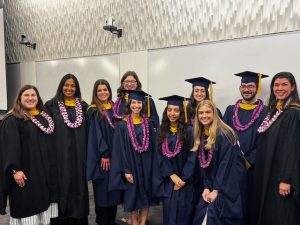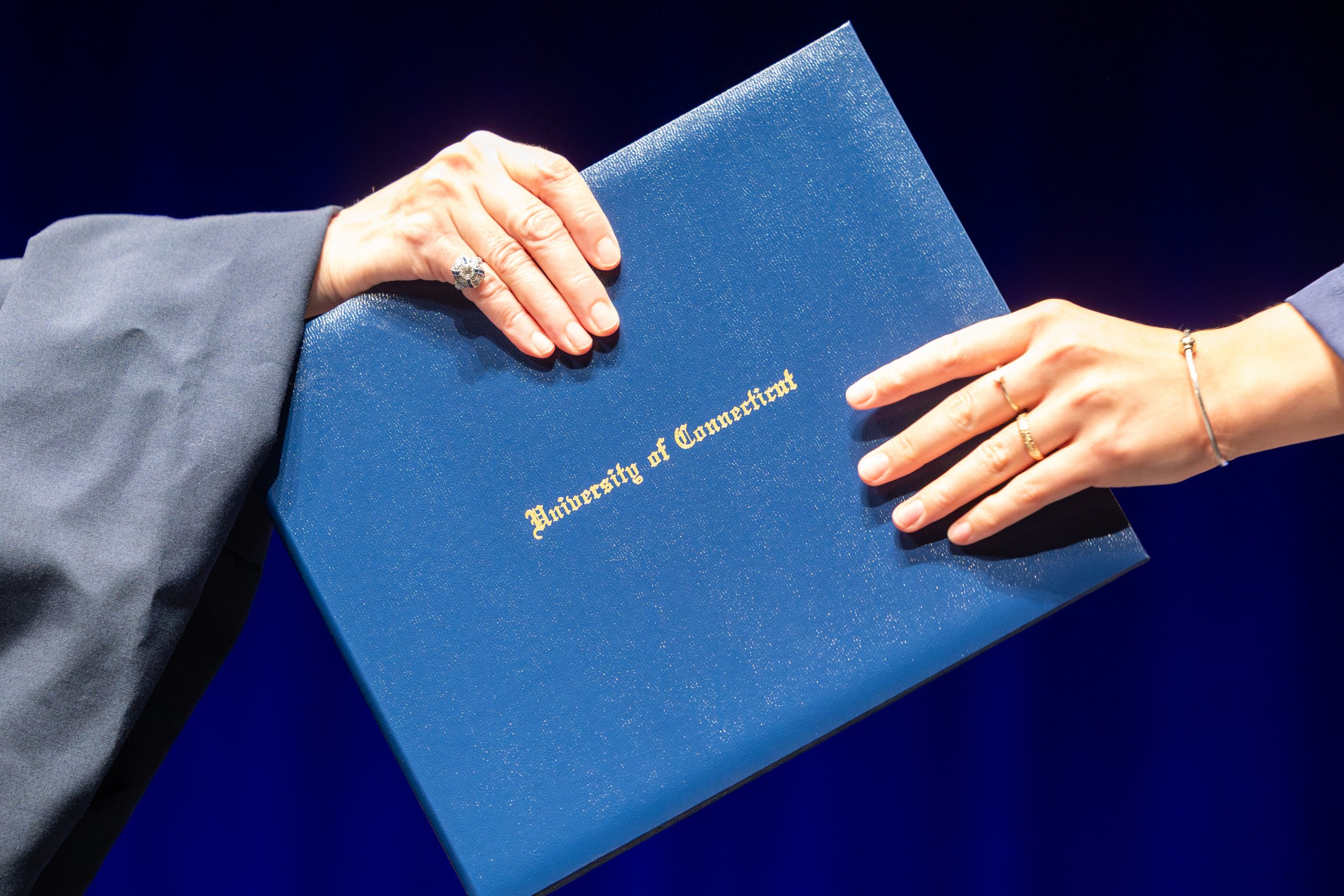First Genetic Counseling Professional Science Master’s Students Graduate
The first graduates from the University of Connecticut’s Professional Science Master’s (PSM) in genetic counseling were hooded last Tuesday. The program was ten years in the making and is the first such accredited program at a public university in New England.
“Watching our first cohort graduate today was nothing short of incredible,” says program director and UConn Health pediatric genetics counselor Maria Gyure. “These graduates didn’t just complete a program – they helped build it. I couldn’t be prouder to send them out into the world as the next generation of genetic counselors. We have no doubt they will serve as exemplary ambassadors for our program and make meaningful contributions to the communities they serve.”

The two-year program is uniquely positioned to give students broad experience in both research and clinical genetics. The Genetic Counseling PSM is housed under the auspices of the Institute for Systems Genomics (ISG). The ISG includes researchers and clinicians at UConn Health, Connecticut Children’s, and The Jackson Laboratory for Genomic Medicine. Those relationships, along with others, allow students to participate in a series of 10-week fieldwork rotations throughout their training. Students are placed in clinical rotations in diverse areas, including prenatal, pediatric, cancer, cardiovascular, and metabolic genetic counseling, as well as a laboratory rotation. An enrichment rotation gives students the opportunity to tailor a fieldwork experience aligned with their individual interests, in specialty clinics, industry, and advocacy.
They are also required to take part in a genetic research project beginning in the second semester. This graduating class focused on areas including forensic genetic genealogy, the human right to health, barriers to newborn genomic research, underrepresented populations in rare disease research, among others.
“The graduating class of 2025 represents a remarkable achievement, not only for the outstanding students in the program, but for the leadership and faculty that have made this program possible,” says ISG director Rachel O’Neill.
UConn’s tuition is generally more affordable than the private university genetic counseling programs elsewhere in the region, making it more accessible for potential students. Interested potential students are encouraged to look at the program’s homepage as applications open in the fall.
Latest UConn Today
- UConn Entrepreneur Aims to Revolutionize Men’s Health CareReza Amin’s Bastion Health creates virtual, confidential, progressive approach to medical screening to help save lives
- UConn’s Sir Cato T. Laurencin Recognized as Springer Nature Editor of DistinctionSir Cato T. Laurencin, MD, Ph.D., K.C.S.L, has received a 2025 Springer Nature Editor of Distinction Award. The award is given to exceptional editors who have demonstrated commitment to upholding scientific accuracy and advancing discovery.
- UConn Health Minute: Two Lives, One TeamAn expectant mom learned she suffered a life-threatening condition. But the high risk pregnancy team at UConn Health had the expertise to keep mom safe as she delivered a healthy baby.
- Overcoming Engineering Challenges Was No Problem for This Student TeamA joint mechanical and electrical and computer engineering Senior Design team tackled various problems in the midst of an electric boat competition
- Beautiful Moments: SFA Alum Brings Smiles to Bridal Couples with Live Event PaintingWhen Erin Leigh Boughamer '94 (SFA) left UConn three decades ago with a degree in graphic design from the School of Fine Arts, event painting hadn’t yet become part of bridal vocabulary. To ask her back then if she foresaw herself with a wardrobe of dressy pantsuits, each with at least a little dollop of acrylic paint on them, she’d have said no way
- Kumar Venkitanarayanan Named Interim Dean of UConn’s College of Agriculture, Health and Natural ResourcesVenkitanarayanan is a leader in the field of egg and poultry meat safety and has served in several leadership roles within the University













